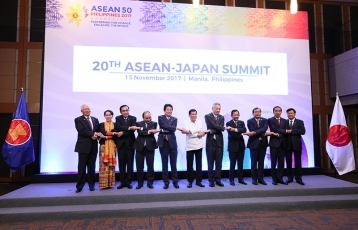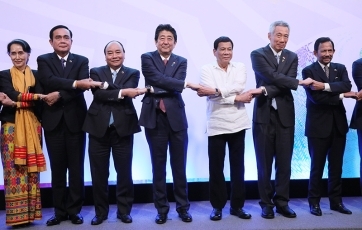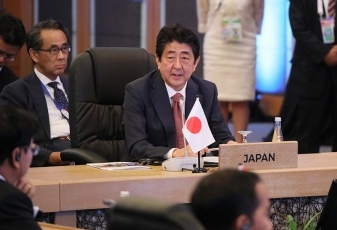Japan-ASEAN Relations
Japan-ASEAN Summit Meeting
November 13, 2017
 Photo: Cabinet Public Relations Office
Photo: Cabinet Public Relations Office
 Photo: Cabinet Public Relations Office
Photo: Cabinet Public Relations Office
 Photo: Cabinet Public Relations Office
Photo: Cabinet Public Relations Office
On Monday, November 13, commencing at 7:30 p.m. for approximately one hour Prime Minister Shinzo Abe attended the Japan-ASEAN Summit Meeting held in Manila, the Republic of the Philippines chaired by His Excellency Mr. Rodrigo R. Duterte, President of the Philippines. The overview of the meeting is as follows.
1 Japan-ASEAN cooperation
(1) Japan-ASEAN cooperation thus far
Prime Minister Abe congratulated the 50th anniversary of the establishment of ASEAN.(2) The next 50 years
Prime Minister Abe expressed his expectation that ASEAN, which is faces two oceans, the Indian and the Pacific Oceans, will lead the world together with Japan to advance the free and open international order based on the rule of law over the next 50 years.(3) The cooperation and way forward
Prime Minister Abe stated that Japan will cooperate to realize a more integrated collective by strengthening the initiatives under the "four pillars of partnership" announced at the ASEAN-Japan Commemorative Summit Meeting in 2013 and utilizing various tools, including the Asian Development Bank (ADB).- In "Partners for Peace and Stability," Japan will enhance human resource development, the provision of goods, and intellectual contributions in each country in order to advance the free and open international order based on the rule of law. Concerning which, Japan will implement cooperation to strengthen maritime law enforcement capabilities of approximately 55 billion yen over the next three years. In light of the rising threat of terrorism in Asia, Japan will continue to assist ASEAN countries with taking measures to combat terrorism and countering violent extremism. Japan is also cooperating to support the reconstruction of Marawi City in the Philippines as well as the efforts of the Government of Myanmar to improve the situation in Rakhine state. In the security area, Japan is strengthening practical defense cooperation under the Vientiane Vision, a policy on Japan-ASEAN defense cooperation.
- In "Partners for Prosperity," Japan will seek to bring the Trans-Pacific Partnership (TPP) Agreement into force expeditiously and pursue a comprehensive, balanced, high quality Regional Comprehensive Economic Partnership (RCEP), and will aim to realize the Free Trade Area of the Asia-Pacific (FTAAP). As for the ASEAN-Japan Comprehensive Economic Partnership (AJCEP) Agreement, negotiations on the protocol amending the Agreement have just been concluded after seven years of work. We welcome this significant outcome and hope to see an early signing of the Protocol. Japan will also continue to proceed with expediting the process of the Japanese ODA loan projects. Japan expects an early conclusion of the Japan-ASEAN Agreement in Technical Cooperation and further expands the tools available for support. Japan will promote the development of quality infrastructure in accordance with international standards such as openness, transparency, economic efficiency of infrastructure, and financial viability of recipient countries. Furthermore, Japan will promote innovation collaborated between Japanese and ASEAN companies, and provide support to raise powerful small- and medium-sized enterprises. Additionally, Japan has for the first time entered a bilateral currency swap agreement with the Philippines that enables the withdrawal of currency in yen, intending to expand it in other countries for financial stability within the region.
- In "Partners for Quality of Life," Japan intends to utilize the Asia Health and Well-being Initiative to achieve healthy and long life societies in Asia, not simply a long life. Japan will also cooperate to build recycling societies through the Japan-ASEAN Environment Cooperation Initiative. In addition, Japan will share its knowledge in the fields of science and technology, disaster reduction and health.
- In "Heart-to-Heart Partners," approximately 30,000 young people to take part in exchanges under the Japan-East Asia Network of Exchange for Students and Youths (JENESYS) program thus far which marks its 10th year this year. The accomplishments include the "WA Project," through which over 2.1 million cultural figures and artists have exchanged, and annual dispatch of 600 people through NIHONGO (Japanese language) Partners. In October this year the first ASEAN Plus Japan Ministerial Meeting on Sports was held. Japan intends to further promote sports exchanges and the spread of Olympic and Paralympic Movement.
2 Regional and international affairs
Prime Minister Abe stated as follows.
(1) North Korea
- The North Korea nuclear and missile issue constitutes an unprecedented, grave and imminent threat. It is necessary to change North Korea's course of actions by using all means available, including the full implementation of the United Nations Security Council (UNSC) resolutions, in order to maximize pressure on North Korea.
- Rather than seek dialogue with North Korea from our side, we should maximize pressure in order to corner North Korea to ask for dialogue while the abandonment of its nuclear and missile development programs. In order to achieve that, the United States' position that all options are on the table is important, and Japan also supports that position.
- North Korea has been abusing the ASEAN region as part of its trade routes and financial networks for sanctions evasions. For that very reason, Japan hopes that the ASEAN member countries will thoroughly utilize their respective tools to put pressure on North Korea, including import and export regulations, restrictions on the movement of people, monitoring of North Korea's "diplomatic corps," and more robust regulations on North Korean laborers.
- Furthermore, Japan intends to play a role in supporting capacity building, including support for customs and law enforcement agencies, from the perspective of addressing in partnership with ASEAN.
- Resolving the abductions issues by North Korea is one of the most important issues for the Abe Administration. A lengthy 40 years have passed since the occurrence of the abductions, and there must be no more delays. Through the ASEAN-related summit meetings, I would like to convey that no bright future exists for North Korea without the resolution of the nuclear and missile issues as well as the abductions issue.
(2) The South China Sea
- Japan highly values the Joint Communique of the ASEAN Foreign Ministers issued in August this year, which presented ASEAN's united intent and capacity for resolving the South China Sea issue, and supports the fundamental principles upheld in it.
- The international community as a whole must raise its voice against any action that infringes on such fundamental principles. Japan will back such efforts made by ASEAN to this end.
- Japan welcomed the development of dialogue between China and ASEAN on the South China Sea, including the Code of Conduct (COC) negotiations and expresses its respect to ASEAN's diplomatic efforts. Japan wishes to see an early conclusion of an effective COC. If tensions ease as a result of these diplomatic efforts, it is only natural that demilitarization will advance.

